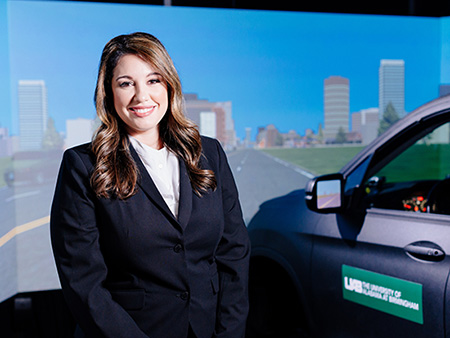 Despina Stavrinos, Ph.D.Educating the public on the hazards faced daily while driving is the epicenter of research for Despina Stavrinos, Ph.D. As an associate professor at the University of Alabama at Birmingham, Stavrinos leads a team of researchers who investigate the psychology of driving behaviors and was recently named to the Birmingham Business Journal’s Top 40 Under 40 class of 2020.
Despina Stavrinos, Ph.D.Educating the public on the hazards faced daily while driving is the epicenter of research for Despina Stavrinos, Ph.D. As an associate professor at the University of Alabama at Birmingham, Stavrinos leads a team of researchers who investigate the psychology of driving behaviors and was recently named to the Birmingham Business Journal’s Top 40 Under 40 class of 2020.
“Despina has combined her interest, training and expertise in human behavior specifically to establish an important research agenda and laboratory focusing on injury prevention and control,” according to Russ Fine, emeritus professor of medicine at UAB. “Her practical research findings and resultant interventions have had a dramatic impact on the way we drive and how we behave while doing so. ‘Dessie’ has chosen a career studying motor vehicle crash-related behaviors that impact everyone, in an effort to keep us safe on the roadways.”
A tenured professor in the UAB Department of Psychology, Stavrinos began the Translational Research for Injury Prevention Laboratory in 2009 under the UAB School of Medicine while completing a two-year postdoctoral fellowship in the UAB Injury Control Research Center and its companion, the UAB Transportation Research Center. In 2009, she was awarded the designation of scientist in both the UAB Injury Control Research Center and in UAB’s federally sponsored University Transportation Center. The TRIP Lab moved to the Department of Psychology along with its founding director, Stavrinos, when she was invited to join the Psychology faculty in 2012
Playing a role in changing driving behavior
Over the past 10 years, the TRIP Lab has investigated the effects of driving distracted, drowsy driving, drivers with developmental disabilities, and drivers with medical impairments, such as orthopedic injury and traumatic brain injury.
In 2016, Honda Manufacturing of Alabama awarded Stavrinos’ lab with the world’s first SUV driving simulator. The full-bodied 2016 Honda Pilot built at their factory in Lincoln, Alabama, was retrofitted with state-of-the-art simulator technology. The simulator, funded by the Alabama Department of Transportation, provides a platform to investigate risky driving behaviors without putting participants in dangerThe National Institutes of Health began funding Stavrinos’ research in 2017 with a $2.2 million grant to conduct a five-year longitudinal study of driving attention among adolescents.
In addition to the work done with the in-lab simulator, Stavrinos and her team continue to educate the public on the risks of driving through community engagement. The program is made possible through a partnership with the Regional Planning Commission of Greater Birmingham. The lab’s portable simulator allows them to go into communities to provide driving safety education. In addition, Stavrinos provides tips for parents as they teach their children to drive and how passenger distractions, texting and drowsy driving put those on the road at risk.
“Dr. Stavrinos’ cutting-edge research in distracted driving has changed and almost single-handedly advanced the manner in which the behavioral sciences are able to study the impact of technologically driven distractions, like cellphones, texting, email and internet surfing, on motor vehicle operator performance,” said Fine, Stavrinos’ former postdoctoral mentor. “It is quite clear to me that this important young scientist, scholar, teacher and mentor is blessed with an abundance of qualities and characteristics that are rare, but essential for success in science and leadership today.”
Studies in injury prevention led by Stavrinos include:
Current studies being led by Stavrinos include:
|
Paving a path for continued driving behavior research
Under Stavrinos’ guidance, the TRIP Lab offers students from various disciplines at various levels of training — from high school to undergraduate, to graduate and postdoctoral studies — the opportunity to conduct high-quality behavioral research. Since 2009, Stavrinos has mentored more than 100 students, including Benjamin McManus, Ph.D., now the assistant director of the TRIP Lab, focusing his research on drowsy driving; Austin Svancara, a graduate student who secured a competitive summer internship at a national traffic safety program in Washington, D.C.; Emma Sartin Goodman, who won best student presentation at an international conference; and many students who have been awarded Dwight David Eisenhower Transportation Research Fellowships, including three in 2019.
Experiential learning is one of the key principles guiding Stavrinos’ teaching philosophy. She is a firm believer that students learn best when they actively participate, whether in a research or classroom setting. Within a research context, experiential learning takes place when students are actively involved in all aspects of the research process.
“These experiences challenge students to truly grasp what research is all about, from start to finish,” said Stavrinos, director of the UAB Development Psychology Ph.D. program. “I am able to provide constructive feedback to further their understanding and advance their critical thinking skills. Experiential learning enables students to develop a strong research skill set they can apply toward future work and further impact the way we take the roads daily.”
